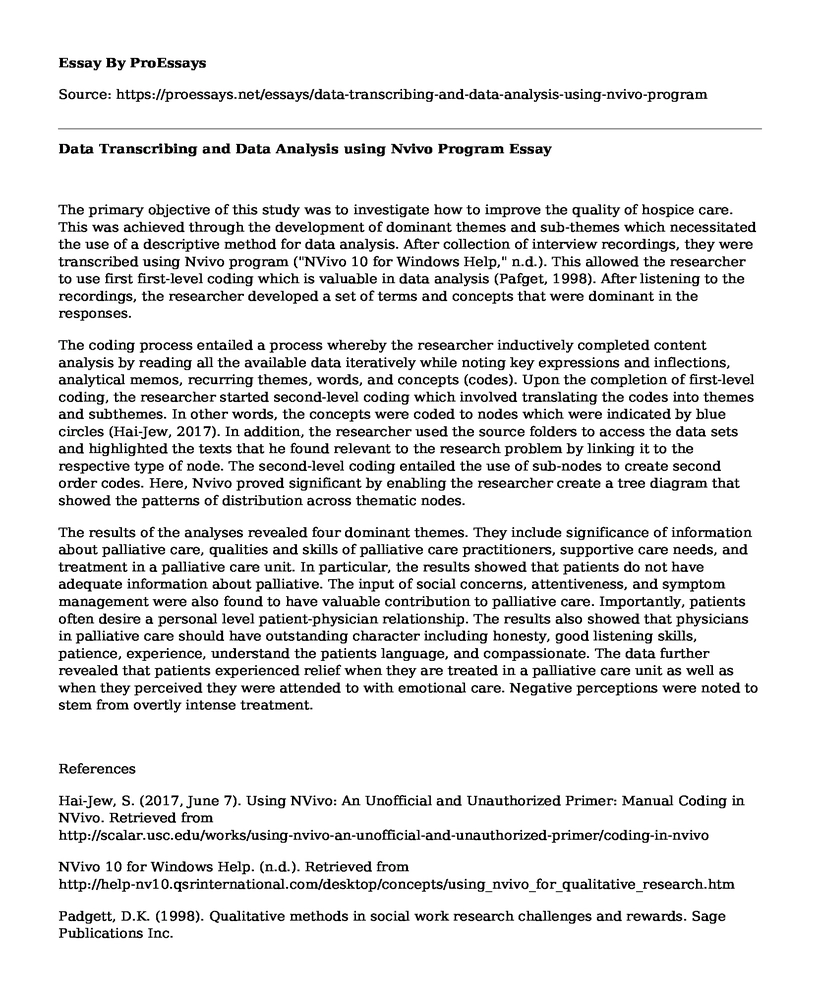The primary objective of this study was to investigate how to improve the quality of hospice care. This was achieved through the development of dominant themes and sub-themes which necessitated the use of a descriptive method for data analysis. After collection of interview recordings, they were transcribed using Nvivo program ("NVivo 10 for Windows Help," n.d.). This allowed the researcher to use first first-level coding which is valuable in data analysis (Pafget, 1998). After listening to the recordings, the researcher developed a set of terms and concepts that were dominant in the responses.
The coding process entailed a process whereby the researcher inductively completed content analysis by reading all the available data iteratively while noting key expressions and inflections, analytical memos, recurring themes, words, and concepts (codes). Upon the completion of first-level coding, the researcher started second-level coding which involved translating the codes into themes and subthemes. In other words, the concepts were coded to nodes which were indicated by blue circles (Hai-Jew, 2017). In addition, the researcher used the source folders to access the data sets and highlighted the texts that he found relevant to the research problem by linking it to the respective type of node. The second-level coding entailed the use of sub-nodes to create second order codes. Here, Nvivo proved significant by enabling the researcher create a tree diagram that showed the patterns of distribution across thematic nodes.
The results of the analyses revealed four dominant themes. They include significance of information about palliative care, qualities and skills of palliative care practitioners, supportive care needs, and treatment in a palliative care unit. In particular, the results showed that patients do not have adequate information about palliative. The input of social concerns, attentiveness, and symptom management were also found to have valuable contribution to palliative care. Importantly, patients often desire a personal level patient-physician relationship. The results also showed that physicians in palliative care should have outstanding character including honesty, good listening skills, patience, experience, understand the patients language, and compassionate. The data further revealed that patients experienced relief when they are treated in a palliative care unit as well as when they perceived they were attended to with emotional care. Negative perceptions were noted to stem from overtly intense treatment.
References
Hai-Jew, S. (2017, June 7). Using NVivo: An Unofficial and Unauthorized Primer: Manual Coding in NVivo. Retrieved from http://scalar.usc.edu/works/using-nvivo-an-unofficial-and-unauthorized-primer/coding-in-nvivo
NVivo 10 for Windows Help. (n.d.). Retrieved from http://help-nv10.qsrinternational.com/desktop/concepts/using_nvivo_for_qualitative_research.htm
Padgett, D.K. (1998). Qualitative methods in social work research challenges and rewards. Sage Publications Inc.
Cite this page
Data Transcribing and Data Analysis using Nvivo Program. (2021, Sep 02). Retrieved from https://proessays.net/essays/data-transcribing-and-data-analysis-using-nvivo-program
If you are the original author of this essay and no longer wish to have it published on the ProEssays website, please click below to request its removal:
- Cyber Security Case Study: Brief Overview of Cybercrimes
- Internet of Things (IoT) and Blockchain Essay Example
- Network Components - Essay Sample
- The Future of Computers and Cyber Security Essay
- How Modern Advancements and High-Tech Gadgets Have Enhanced Lives
- Essay Sample on Cybersquatting: Understanding the Anticybersquatting Consumer Protection Act
- Essay Example on Harold Innis & Applying His Concepts to the Internet







